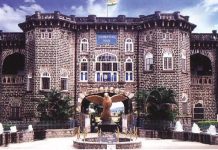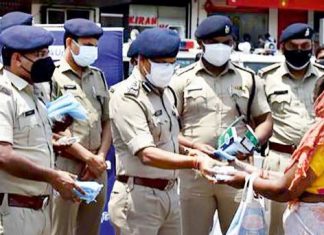 Maharashtra has the second highest number of juveniles in the country that are in conflict with the law, according to data released by the National Crime Records Bureau (NCRB). Distressing as it may sound, the State also has a high incidence of radicalization among young people.
Maharashtra has the second highest number of juveniles in the country that are in conflict with the law, according to data released by the National Crime Records Bureau (NCRB). Distressing as it may sound, the State also has a high incidence of radicalization among young people.
 With overwhelming data supporting the finding that a large chunk of Maharashtra’s youth was moving into violent gear, a concerned State Police has been working to address this issue. A community model has been designed and implemented in schools and colleges to foster greater interaction between the police force and students.
With overwhelming data supporting the finding that a large chunk of Maharashtra’s youth was moving into violent gear, a concerned State Police has been working to address this issue. A community model has been designed and implemented in schools and colleges to foster greater interaction between the police force and students.
But the top-down nature of this conventional model has ensured that, more often than not, the attempts have been in vain —students listen to the words of the police officer but later dismiss what they have heard.
The good news is that a positive change is slowly but steadily rolling in. And this transformation is happening due to the efforts of people like IPS Officer – Harssh A Poddar.
The ASP of Malegaon’s unique initiative has created a 42,000 strong group of young leaders against crime and terror in the last three years!
 A law graduate from National University of Juridical Sciences(NUJS) Kolkata, Harssh has a tall list of notable achievements under his belt. He is a winner of the prestigious Chevening Scholarship(a scholarship awarded by the UK government to outstanding students with leadership potential). He completed his Masters in International and Constitutional Law from Balliol College, Oxford University. Following this, Harssh joined as a corporate lawyer with Clifford Chance in London before returning to India to pursue something much closer to his heart. Harssh fulfilled his dream when he aced the UPSC examination not once, but twice. The first time he made it into Indian Revenue Service(IRS) and the second time, in 2013, he secured the rank of 361 to opt for Indian Police Service (IPS).
A law graduate from National University of Juridical Sciences(NUJS) Kolkata, Harssh has a tall list of notable achievements under his belt. He is a winner of the prestigious Chevening Scholarship(a scholarship awarded by the UK government to outstanding students with leadership potential). He completed his Masters in International and Constitutional Law from Balliol College, Oxford University. Following this, Harssh joined as a corporate lawyer with Clifford Chance in London before returning to India to pursue something much closer to his heart. Harssh fulfilled his dream when he aced the UPSC examination not once, but twice. The first time he made it into Indian Revenue Service(IRS) and the second time, in 2013, he secured the rank of 361 to opt for Indian Police Service (IPS).
During his training at the Sardar Vallabhbhai Patel National Police Academy, Harssh did a project that involved conducting a workshop for blind children. What made this workshop’s format different from conventional ones was that the children were divided into small groups and asked to draft laws for the differently abled (instead of just listening to lectures on rights and awareness).
 Harssh observed that with assistance and encouragement provided by the IPS probationers, the children could be induced to examine the subject deeply and act as their own lobby. This learning remained with him even as he was deputed on his first posting with Maharashtra Police. The same thought struck Harssh a couple of years later when he was asked by Maharashtra’s DGP to suggest innovative policies that would effectively tackle juvenile delinquency in the State. His idea was accepted and thus began the Youth Parliament Championship.
Harssh observed that with assistance and encouragement provided by the IPS probationers, the children could be induced to examine the subject deeply and act as their own lobby. This learning remained with him even as he was deputed on his first posting with Maharashtra Police. The same thought struck Harssh a couple of years later when he was asked by Maharashtra’s DGP to suggest innovative policies that would effectively tackle juvenile delinquency in the State. His idea was accepted and thus began the Youth Parliament Championship.
Conceptualized and coordinated by Harssh (the then-ASP of Karveer), this initiative’s core aim was to break the strong linkage between alienation and crime by giving the youth a platform to take action against anti-social tendencies. Under the pro-active officer’s able guidance, pilot projects were started in Aurangabad’s Nath Valley School (NVS) and Aurangabad Police Public School(APPS). The selected students were divided into teams of three and given a number of topics related to crime (such as sexual offences, terrorism, naxalism, corruption, financial fraud etc).
 Each team was also given the part of a particular stakeholder (like the government, the police department and the civic society) and a speaker from each was chosen to speak about their role in crime prevention. Each team was also asked to come up with solutions pertaining to the part they were playing.
Each team was also given the part of a particular stakeholder (like the government, the police department and the civic society) and a speaker from each was chosen to speak about their role in crime prevention. Each team was also asked to come up with solutions pertaining to the part they were playing.
When an impact assessment was conducted, it was clear that this bottom-up approach had led to growing awareness among the students about the issues they had discussed. More significantly, it was noticed that the students(particularly those from the lower and middle-income groups) were acting as crucial agents of awareness for their family and neighbours.
In fact, a Thematic Apperception Test (TAT), a non-intrusive means of testing the potential of an individual to veer towards crime or radicalization, designed by psychology students of Dr. Babasaheb Ambedkar Marathwada University (BAMU), showed a marked reduction in the potential for criminal behavior among the participants.
Encouraged by the success of Harssh’s idea, Maharashtra Police began replicating the project in other districts. Ever since, this simple yet powerful idea has reached out to nearly 42000 youngsters, ensuring that they do not go down the path of violence.
 Interestingly, this is not the only reason for the immense respect Harssh commands in the inner circle of Maharashtra Police. The people-centric officer has also been streamlining the management of rural police stations and getting them ISO – certified with infrastructure funds from village panchayats. He has also launched an innovative project, Udaan, that provides free coaching for entrance exams and career counselling to local students. More recently, when violence erupted in several cities of Maharashtra over the Bhima-Koregaon issue, Malegaon remained peaceful, thanks to the efforts of Harssh and his hardworking team.
Interestingly, this is not the only reason for the immense respect Harssh commands in the inner circle of Maharashtra Police. The people-centric officer has also been streamlining the management of rural police stations and getting them ISO – certified with infrastructure funds from village panchayats. He has also launched an innovative project, Udaan, that provides free coaching for entrance exams and career counselling to local students. More recently, when violence erupted in several cities of Maharashtra over the Bhima-Koregaon issue, Malegaon remained peaceful, thanks to the efforts of Harssh and his hardworking team.
What makes this fact especially remarkable is that Malegaon has a long history of violent strife, bomb blasts and communal disturbance. Located in Nashik district, it has a sizeable population of Dalits, Muslims and Hindus. As such, it presents a formidable challenge to law enforcement agencies.
 Cognizant of these facts, Harssh’s first steps when taking charge was reinforcing intelligence networks and preparing police stations for social disturbances that may erupt suddenly. This included surprise riot-control drills, timely maintenance of equipment, and creation of a community network that would provide timely information to the police force.
Cognizant of these facts, Harssh’s first steps when taking charge was reinforcing intelligence networks and preparing police stations for social disturbances that may erupt suddenly. This included surprise riot-control drills, timely maintenance of equipment, and creation of a community network that would provide timely information to the police force.
To ensure that irrefutable evidence was collected to identify and book unruly elements that incited the public, Harssh also got CCTV cameras installed on a series of police vans.
However, while his administrative brilliance makes him popular in official circles, it is the officer’s instinctive thoughtfulness that endears him deeply to the common man.













